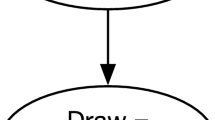This paper investigates Walley's concepts of epistemic irrelevance and epistemic independence for imprecise probability models. We study the mathematical properties of irrelevance and independence, and their relation to the graphoid axioms. Examples are given to show that epistemic irrelevance can violate the symmetry, contraction and intersection axioms, that epistemic independence can violate contraction and intersection, and that this accords with informal notions of irrelevance and independence.
Similar content being viewed by others
References
J.-M. Bernard, T. Seidenfeld and M. Zaffalon, eds., in: Proceedings of the Third International Symposium on Imprecise Probabilities and Their Applications (Carleton Scientific, Lugano, Switzerland, 2003).
I. Couso, S. Moral and P. Walley, A survey of concepts of independence for imprecise probabilities, Risk, Decision and Policy 5 (2000) 165–181.
F.G. Cozman, Irrelevance and independence relations in quasi-Bayesian networks, in: XIV Conference on Uncertainty in Artificial Intelligence, eds. G. Cooper and S. Moral (Morgan Kaufmann, San Francisco, 1998) pp. 89–96.
F.G. Cozman, Irrelevance and independence axioms in quasi-Bayesian theory, in: European Conference on Symbolic and Quantitative Approaches to Reasoning with Uncertainty, eds. A. Hunter and S. Parsons (Springer, Berlin Heidelberg New York, 1999) pp. 128–136.
F.G. Cozman, Credal networks, Artificial Intelligence 120 (2000) 199–233.
F.G. Cozman, Algorithms for conditioning on events of zero lower probability, in: Fifteenth International Florida Artificial Intelligence Research Society Conference, eds. S. Haller and G. Simmons (AAAI, Menlo Park, California, 2002) pp. 248–252.
A.P. Dawid, Conditional independence, in: Encyclopedia of Statistical Sciences, Update Volume 2, eds. S. Kotz, C.B. Read and D.L. Banks (Wiley, New York, 1999) pp. 146–153.
A.P. Dawid, Separoids: A mathematical framework for conditional independence and irrelevance, Annals of Mathematics and Artificial Intelligence 32 (2001) 335–372.
C.P. de Campos and F.G. Cozman, Belief updating and learning in semi-qualitative probabilistic networks, in: Conference on Uncertainty in Artificial Intelligence, eds. F. Bacchus and T. Jaakkola (AUAI, Edinburgh, 2005).
L. de Campos and S. Moral, Independence concepts for convex sets of probabilities, in: XI Conference on Uncertainty in Artificial Intelligence, eds. P. Besnard and S. Hanks (Morgan Kaufmann, San Francisco, 1995) pp. 108–115.
G. de Cooman, F.G. Cozman, S. Moral and P. Walley, eds., in: Proceedings of the First International Symposium on Imprecise Probabilities and Their Applications (Imprecise Probabilities Project, Ghent, Belgium, 1999).
G. de Cooman, T.L. Fine and T. Seidenfeld, eds., in: Proceedings of the Second International Symposium on Imprecise Probabilities and Their Applications (Shaker, Maastricht, The Netherlands, 2001).
D. Galles and J. Pearl, Axioms of causal relevance, Artificial Intelligence 97 (1997) 9–43.
D. Geiger, T. Verma and J. Pearl, Identifying independence in Bayesian networks, Networks 20 (1990) 507–534.
J.Y. Halpern, Reasoning About Uncertainty (MIT, Cambridge, Massachusetts, 2003).
P. Hansen and B. Jaumard, Probabilistic satisfiability. Technical Report, Les Cahiers du GERAD, École Polytechique de Montréal, G-96-31, 1996.
I. Levi, The Enterprise of Knowledge (MIT, Cambridge, Massachusetts, 1980).
F. Matús and M. Studený, eds., in: Workshop on Conditional Independence Structures and Graphical Models (Fields Institute for Research in Mathematical Sciences, Toronto, 1999).
S. Moral, Epistemic irrelevance on sets of desirable gambles, in: Second International Symposium on Imprecise Probabilities and Their Applications, eds. G. de Cooman, T.L. Fine and T. Seidenfeld (Shaker, Maastricht, The Netherlands, 2001) pp. 247–254.
N.J. Nilsson, Probabilistic logic, Artificial Intelligence 28 (1986) 71–87.
S. Parsons. Qualitative Approaches to Reasoning Under Uncertainty (MIT, Cambridge, Massachusetts, 2001).
J. Pearl, Probabilistic Reasoning in Intelligent Systems: Networks of Plausible Inference (Morgan Kaufmann, San Mateo, California, 1988).
J. Pearl, Causality: Models, Reasoning, and Inference (Cambridge University Press, Cambridge, UK, 2000).
J. Pearl, On two pseudo-paradoxes in Bayesian analysis, Annals of Mathematics and Artificial Intelligence 32 (2001) 171–177.
T. Seidenfeld and L. Wasserman, Dilation for sets of probabilities, Annals of Statistics 21 (1993) 1139–1154.
P. Spirtes, C. Glymour and R. Scheines, Causation, Prediction, and Search, 2nd ed. (MIT, Cambridge, Massachusetts, 2003).
M. Studený, Conditional independence relations have no finite complete characterizations, in: Transactions of the Eleventh Prague Conference on Information Theory, Statistical Decision Functions, Random Processes, eds. S. Kubik and J.A. Visek (Kluwer, Dordrecht, 1992) pp. 377–396.
M. Studený, Semigraphoids and structures of probabilistic conditional independence, Annals of Mathematics and Artificial Intelligence 21 (1997) 71–98.
B. Vantaggi, Graphical models for conditional independence structures, in: Second International Symposium on Imprecise Probabilities and Their Applications, eds. G. de Cooman, T.L. Fine and T. Seidenfeld (Shaker, Maastricht, The Netherlands, 2001) pp. 332–341.
J. Vejnarová. Conditional independence relations in possibility theory, in: First International Symposium on Imprecise Probabilities and Their Applications, eds. G. de Cooman, F.G. Cozman, S. Moral and P. Walley (Imprecise Probabilities Project, Ghent, Belgium, 1999) pp. 343–351.
P. Vicig, Epistemic independence for imprecise probabilities, International Journal of Approximate Reasoning 24 (2000) 235–250.
P. Walley, Statistical Reasoning with Imprecise Probabilities (Chapman and Hall, London, 1991).
P. Walley, Measures of uncertainty in expert systems, Artificial Intelligence 83 (1996) 1–58.
P. Walley and T.L. Fine, Towards a frequentist theory of upper and lower probability, Annals of Statistics 10 (1982) 741–761.
P. Walley, R. Pelessoni and P. Vicig, Direct algorithms for checking consistency and making inferences from conditional probability assessments, Journal of Statistical Planning and Inference 126 (2004) 119–151.
M.P. Wellman, Fundamental concepts of qualitative probabilistic networks, Artificial Intelligence 44 (1990) 257–303.
Author information
Authors and Affiliations
Corresponding author
Rights and permissions
About this article
Cite this article
Cozman, F.G., Walley, P. Graphoid properties of epistemic irrelevance and independence. Ann Math Artif Intell 45, 173–195 (2005). https://doi.org/10.1007/s10472-005-9004-z
Accepted:
Published:
Issue Date:
DOI: https://doi.org/10.1007/s10472-005-9004-z




